

Submitted by Alan Pryor
Citing grounds of “excessive traffic, greenhouse gas emissions, and poor land-use and planning”, the Sierra Club announces its opposition to Measure B in Davis CA on the November 2020 municipal ballot.
Measure B is a vote to allow the annexation of approximately 200-acres of Prime farmland on the northeast periphery of the City and the development of a business park along with a 850-unit housing development. The project site is now farmed and serves as foraging habitat for numerous Special Status Species including Burrowing Owls, Swainson’s Hawks, and White-Tailed Kites.
The endorsement of the opposition to this ballot measure follows an extensive evaluation process by the local Sierra Club Yolano Group, the Sierra Club Mother Lode Chapter Political and Executive Committees, and the Sierra Club California Local Measure Review Committee.
The Sierra Club has long-standing official policies designed to minimize urban sprawl onto farmland and habitat and maximize intensive infill development. These include planning policies that further conservation of open space and preservation of natural areas and agricultural lands. The Sierra Club opposes sprawl as a pattern of increasingly inefficient and wasteful land use with  devastating environmental and social outcomes.
devastating environmental and social outcomes.
“While the Sierra Club is strongly supportive of efforts to stimulate economic development and provide housing, particularly for working families, we do not support the DISC development which will turn almost 200-acres of productive Prime farmland into a massive, sprawling, auto-dependent business park”, said Alan Pryor, chair of the local Sierra Club Yolano Group. “Although some on-site housing units will be constructed, there is no mechanism to ensure that the housing will be occupied by workers at the development project itself”.
“This development is inconsistent with official Sierra Club land use policies encouraging infill development. Instead, the project is reminiscent of peripheral, sprawling, car-centric developments of earlier times that encourage long-range commuting. It is the antithesis of smart urban planning”, added Mr. Pryor.
Of particular concern is the 24,000+ daily auto trips projected to result from the development adding further congestion to an already bottle-necked City thoroughfare, Mace Blvd., and the I-80 freeway. In addition to the wait-times and traffic disruption, this excessive traffic is the primary contributor to the over 83 million pounds of additional greenhouse gases projected to be produced by the project. This DISC project alone would increase the greenhouse gas footprint of Davis by over 8% jeopardizing the City’s mandate of carbon neutrality by 2040.
This project further suffers from the lack of an integrated transportation infrastructure plan. The project proponents only claim that a Transportation Demand Management Plan will be created in the future once zoning entitlements are approved by the voters. But the promoters do not guarantee any reductions in actual traffic counts or reductions in greenhouse gas emissions. This is not acceptable from an environmental perspective.
The project is also an example of the City allowing sprawl onto peripheral farmlands through exceptions to the General Plan rather than focusing on updating this important planning document. Properly planned, instead of depending on commuter traffic for viability, a project at the site could offer an important opportunity for meeting development needs in Davis in a manner that reflects Davis values – vibrant integrated and connected neighborhoods in a mixed-use setting, affordable co-housing, community gardens and edible vegetation, appropriate commercial and live-work buildings, all bordered by protected farmland and open space.
Working towards these goals necessitates a General Plan update or an Area-Specific Plan. Piecemeal speculative development, focusing on one project at a time, will preclude this important planning opportunity to consider community needs and values.
